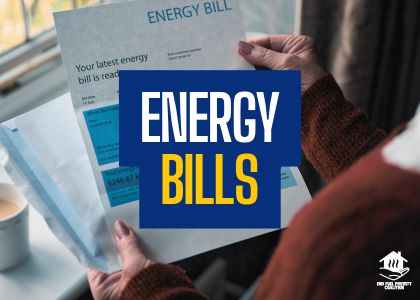Energy suppliers will have to offer at least one “low standing charge” tariff from early next year.
A four-week long Ofgem consultation will open the door to the new arrangements, which the regulator says will give consumers more choice on how they pay standing charges. If approved, the plans will allow households to pay the costs of running the grid as part of their unit rate by lowering the daily fixed (standing charge) amount.
A spokesperson for the End Fuel Poverty Coalition, commented:
“Requiring suppliers to offer a lower standing charge tariff is a small step forward, but it is not a cure for people struggling with high energy bills and fuel poverty.
“Prepayment meter customers in particular face the greatest detriment from high standing charges, which build up as debt even while people are not using any energy at all. To make a difference, these tariffs must be available to everyone and they must be easy to compare with existing deals.
“The energy industry must make sure that households properly understand the deals they are signing up for – and if a lower standing charge option will benefit them or not.
“And this development doesn’t negate the need for long term reform to make the system fairer, provide support for households struggling with high energy costs, improve the energy efficiency of people’s homes and increase our energy security through more homegrown renewable power.”
A spokesperson for Independent Age, said:
“Older people on low incomes have consistently expressed their frustration with standing charges that can be unfair and excessive. Which is why we welcome Ofgem’s proposal for energy providers to deliver low standing charge tariff options from next year. For this policy to be a success, the regulator must ensure that suppliers make these tariffs easily accessible and provide the full picture regarding the benefits and drawbacks of switching to one.
“While welcome, this reform does not address the affordability crisis. The weather is starting to get colder and last winter was especially brutal for older people in financial hardships. We regularly heard from people in later life that were sitting in cold damp homes or visiting public places to stay warm. The UK Government cannot allow this to happen again.
“They were right to expand the eligibility criteria for the Winter Fuel Payment, but now it’s time to start lifting people out of fuel poverty. To do this, the UK Government should introduce a discounted energy social tariff that will finally make standing charges and unit rates more affordable for those in greatest need.”
National Energy Action said:
“Given the public anxiety about standing charges, any progress in this area is positive, but it’s taken a long time to make even this modest step forward and regardless, Standing Charges or unit charges recovered through the overall energy bills, will remain high and even increase.
“Ofgem’s proposals also won’t change the differences consumers pay depending on where they live in GB or how pre-payment households will still be disproportionately impacted by how these fixed or higher unit charges are recovered if they fall into further difficulties paying their energy bills.
“Much of this complexity is being left at the feet of consumers to work through and there is a big worry this could just cause even further disengagement or distrust in what is considered already a baffling market. Given that the main programmes which support energy advice have yet to be extended beyond March next year, the enhanced need for impartial and in-depth advice and support could create huge challenges.”
Jonathan Bean from Fuel Poverty Action, commented:
“Yet again, Ofgem is pretending to help struggling households but is actually protecting energy firms. Instead of tackling the excessive energy industry profits, costs and levies buried in standing charges, it is now trying to hide them in unit costs. People will be left confused instead of protected.”
“This latest Ofgem plan is designed to distract us from high energy prices which are up 70% over five years, despite Government promises to reduce them. People don’t want more confusing options, they just want affordable energy.”
“The government cannot keep hiding behind Ofgem. It must now step in to bring down energy bills before more people get sick and die in cold homes this winter.”

